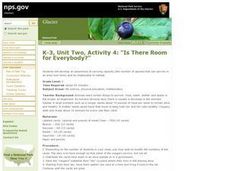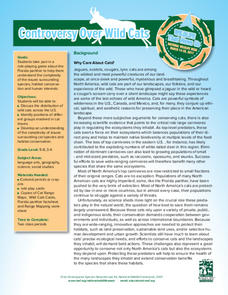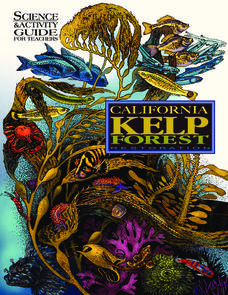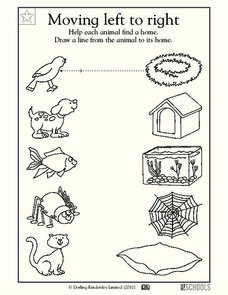Curated OER
Knowing the Essential Elements of a Habitat
First graders compare their environment with that of Belize by researching via the internet on the sites provided. Students participate in various activities/centers utilizing the information they discovered.
Curated OER
Fragile Reefs
Students research how coral reefs form, where they are located, and what plant and animal species find shelter in reefs, build and display diorama to represent coral and animals that live in coral reef, and participate in discussion...
Curated OER
Cycling of Matter and Energy
These twenty various types of questions related to the cycling of matter and energy require students to match each definition in column 1 with the correct vocabulary term from column 2. Then, students explain what is being demonstrated...
Curated OER
Tropical Rainforests
Students create their own rainforest environment. This tropical rainforest lesson, introduces where rainforests are located, their real world connections, and their structural make up. It includes further resources online.
Wilderness Classroom
Ocean Life
Our oceans are composed of many complex relationships. Young oceanographers explore relationships between organisms, understand the world ocean's currents, and discover the effects of water pollution and how it behaves. There are three...
Curated OER
Dream Stream
Investigate the parts of a healthy stream to build content-specific vocabulary and ecological awareness. The class builds vocabulary and determines why clean water is important for trout. They design a shoe box to show what a clean...
Curated OER
What Do Koalas Need to Survive?
First graders take a field trip and examine the Koala and his habitat. In this Koala lesson, 1st graders read Possum Magic and discuss the foods of Australia. Students view the habitat of a Koala and record what it eats, its physical...
Curated OER
Raven Chapter 54 Guided Notes: Community Ecology
Providing a sweeping overview of population and community interactions, this ecology worksheet gets learners thinking. They differentiate between habitat and niche, describe and give exemplars of various animal and plant defenses,...
Curated OER
Is There Room for Everybody?
Third graders examine the capacity of animals able to live in one habitat. In this habitat lesson, 3rd graders play a game that shows the food chain and the interactions between animals in an area. Students discover that food is a major...
National Wildlife Federation
Habitat for Sale
Where would this animal like to live? Pupils choose an animal and write an ad to advertise that animal's habitat or home. For a little fun, learners create the newspaper ads to provide enough detail for classmates to guess what animal...
National Wildlife Federation
Habitat Web
It's all connected. Classes create a web to connect living things in a local ecosystem. They create cards with both living and nonliving things found in their areas while considering the characteristics of each. After they have a good...
National Wildlife Federation
Massive Migrations: Grades K-4
Bird migration is a fascinating behavior. Budding scientists experience their own migrations using the school grounds for their flight patterns. They follow a map that leads them through a migration pattern that includes stops for...
National Wildlife Federation
Butterfly Life Cycle
Caterpillars and butterflies each have their own unique challenges. While studying the life cycle of butterflies, learners focus on the threats to each stage. While some threats will be the same, each stage has its own unique challenge.
National Wildlife Federation
Endangered Species: What and Where?
What do endangered species have in common with non-endangered species? Given an endangered species to read about, individuals choose another species that is not endangered to compare it to. As a class, they create a species book with the...
National Wildlife Federation
Controversy Over Wild Cats
Everyone should take an interest in the fate of wild cats. A thorough instructional activity explores the habitat changes of native North American wild cats and asks learners to make connections to human development. They consider the...
National Wildlife Federation
Build a Bat House!
Bats usually get a bad rap. Scholars learn about the importance of bats and the threat their declining population has on the environment. They then build bat houses to attract and welcome bats into the area.
Dawn N . Ericson
California Kelp Forest Restoration
This unit is so cool, you won't be able to "kelp" yourself! Intended for all grades, this science and activity guide for teachers offers a unique opportunity to understand kelp's role as a valuable ecological resource. Teachers and...
National Wildlife Federation
Watershed Web: A Field Trip
Observing plant succession doesn't have to be a decade long process. A hands-on instructional activity has groups study succession over a designated space. Learners use their observation skills to record differences in plant and soil...
K12 Reader
Competing for Resources
Young biologists examine the concept of scarce resources with a reading comprehension passage. After finishing the paragraphs, learners turn to the questions to demonstrate what they have learned about what is beneficial and what is...
Curated OER
Moving Left to Right
These animals need to find their homes! Young scholars help them by drawing lines from each animal on the left to its habitat on the right. There is no guessing to be done here, though; pairs are directly across from one another. They...
Keeping a Betta
Swim with the fishes. Class members observe, research, and record physical characteristics of Betta fish. They change the environment of the aquarium by adding rocks and plants and observe any reactions the fish have to the new environment.
Curated OER
African Savanna Habitat Diorama Craft
Set the stage for a unit or lesson on the African savanna by creating a cute habitat diorama. Cheetahs, lions, zebras, and elephants are all present in a shoe-box-sized craft that requires your learners to color, cut, and paste. These...
National Wildlife Federation
Massive Migrations
Turn your students into flocks of migratory birds for this fun activity on animal migration. Prior to the activity, the teacher creates four different migration routes in the classroom or any available open space, labeling nesting...
Smarter Balanced
Zoos
How do the experiences of animals living in zoos differ from animals living in the wild? To prepare for a performance assessment on this question, class members are introduced to key concepts and vocabulary, and then groups use a Venn...

























